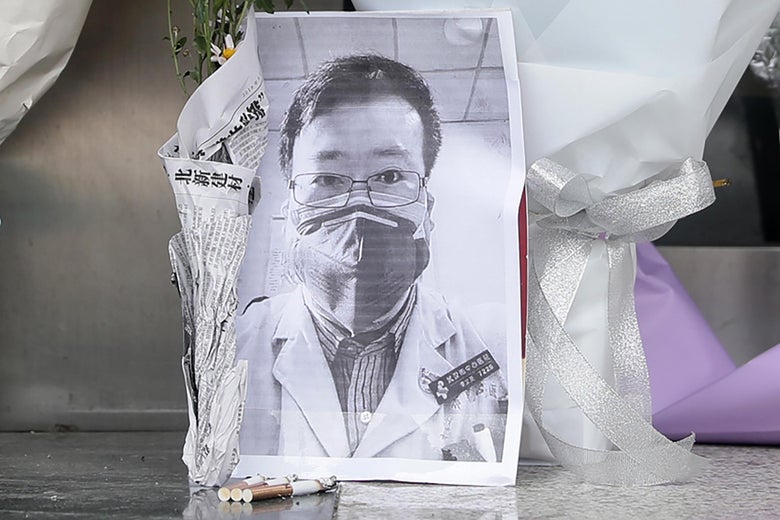

A photo of the late ophthalmologist Li Wenliang is seen with flower bouquets at the Houhu Branch of Wuhan Central Hospital in Wuhan in China’s central Hubei province on Feb. 7, 2020.
STR/Getty Images
The Chinese doctor in Wuhan who tried to sound the alarm in the early stages of what would soon become the coronavirus outbreak died Friday from the virus. The 34-year-old ophthalmologist Li Wenliang tried to raise concerns around the new year about what was then an unidentified virus. On Dec. 30, Li described to medical school classmates in an online chatroom that what he was seeing in the capital of Hubei Province resembled Severe Acute Respiratory Syndrome (or SARS). The Chinese state apparatus quickly intervened. Li was interrogated by both medical authorities and police before being forced to sign a statement disavowing his early warning of the deadly disease as an “illegal rumor.” Soon, however, thousands of residents in Wuhan had contracted the virus that has now spread around the world claiming hundreds of lives so far, including Dr. Li, who contracted the disease from a glaucoma patient he was treating.
In China, Li is being referred to as a whistleblower. Most places he would just be referred to as a doctor. It’s a maddening story of censorship and propaganda, one that shows the global impact that China’s stifling approach to hard truths can and will have on us all. For years, economic opening and technological advance have been seen as potential drivers of systemic political change in China, but in many ways its worked the other way around. The expansion of Chinese economic influence buoyed by technology has effectively exported its values of secrecy in the name of stability. You need not look farther than the hushed responses across the West to the pro-democracy protests in Hong Kong and China’s chilling treatment of the Uighurs. That silence you heard from the NBA, from Donald Trump, from the once-vocal corners of the globe, was the sound of punches getting pulled, values getting quietly shelved, reality rearranged. But what the last month has shown is the silver bullet to propaganda everywhere is going to be something far less hopeful—disease. The threat of pandemic requires experts and truth, honest and principled leadership. Without it, alternative sources of power well up. Technological authoritarianism and craven populism might be effective in placating the masses, wherever they reside, dividing by confusion and convenience, obfuscation and fear, but when you tell people it’s safe for their kids to go outside and you know it’s not, something changes in people, the stakes change.
The Chinese government has largely held its line, taking down unharmonious feelings of anger and anguish, and pushing out numbing statements. “[Li] had the misfortune to be infected during the fight against the novel coronavirus pneumonia epidemic, and all-out efforts to save him failed,” the Wuhan City Central Hospital announced on Weibo. “We express our deep regret and condolences.” But there have been rare outbursts of public anger about Li’s death and China’s treatment of the truth. “Dr. Li’s death appeared unlikely to inspire protests in Wuhan, which has been under lockdown for just over two weeks in an unprecedented effort to extinguish the epidemic,” the New York Times reports. “In Wuhan and other heavily restricted areas of Hubei, residents mostly stay inside their homes and avoid socializing for fear of catching the virus.”
The result? “The Chinese public have staged what amounts to an online revolt after the death of [Li Wenliang] who tried to warn of a mysterious virus that has since killed hundreds of people in China, infected tens of thousands and forced the government to corral many of the country’s 1.4 billion people,” the Times reports. “Since late Thursday, people from different backgrounds, including government officials, prominent business figures and ordinary online users, have posted numerous messages expressing their grief at the doctor’s death and their anger over his silencing by the police after sharing his knowledge about the new coronavirus. It has prompted a nationwide soul-searching under an authoritarian government that allows for little dissent.”
Here are some examples from the Times of the extraordinary dissent being voiced largely online:
• “Refusing to listen to your ‘whistling,’ your country has stopped ticking, and your heart has stopped beating,” Hong Bing, the Shanghai bureau chief of the Communist Party’s official newspaper, People’s Daily, wrote on her timeline on WeChat, an instant-messaging platform. “How big a price do we have to pay to make you and your whistling sound louder, to reach every corner of the East?”
• Both the Chinese- and English-language Twitter accounts of People’s Daily tweeted that Mr. Li’s death had prompted “national grief.” Both accounts deleted those messages before replacing them with more neutral, official-sounding posts.
• The Weibo account of Shandong Province’s law enforcement body posted a portrait of Mr. Li with two sentences that have been circulating online: “Heroes don’t fall from the sky. They’re just ordinary people who stepped forward.”
• “It’s time to reflect on the deeply-rooted, stability-trumps-everything thinking that’s hurt everyone,” Wang Ran, chairman of the investment bank CEC Capital, wrote on Weibo. “We all want stability,” he asked. “Will you be more stable if you cover the others’ mouths while walking on a tightrope?
Pandemic, it turns out, may be a great leveler, the alarm clock awakening us from our slide into an authoritarian doze—and not just in China.
Read Again https://news.google.com/__i/rss/rd/articles/CBMic2h0dHBzOi8vc2xhdGUuY29tL25ld3MtYW5kLXBvbGl0aWNzLzIwMjAvMDIvY2hpbmEtZG9jdG9yLWxpLWRpZXMtY29yb25hdmlydXMtd2hpc3RsZWJsb3dlci1wdWJsaWMtYW5nZXItZGlzc2VudC5hbXDSAXNodHRwczovL3NsYXRlLmNvbS9uZXdzLWFuZC1wb2xpdGljcy8yMDIwLzAyL2NoaW5hLWRvY3Rvci1saS1kaWVzLWNvcm9uYXZpcnVzLXdoaXN0bGVibG93ZXItcHVibGljLWFuZ2VyLWRpc3NlbnQuYW1w?oc=5Bagikan Berita Ini















0 Response to "Rare Public Anger in China After Silenced Doctor Who Warned of Coronavirus Dies of the Virus - Slate"
Post a Comment